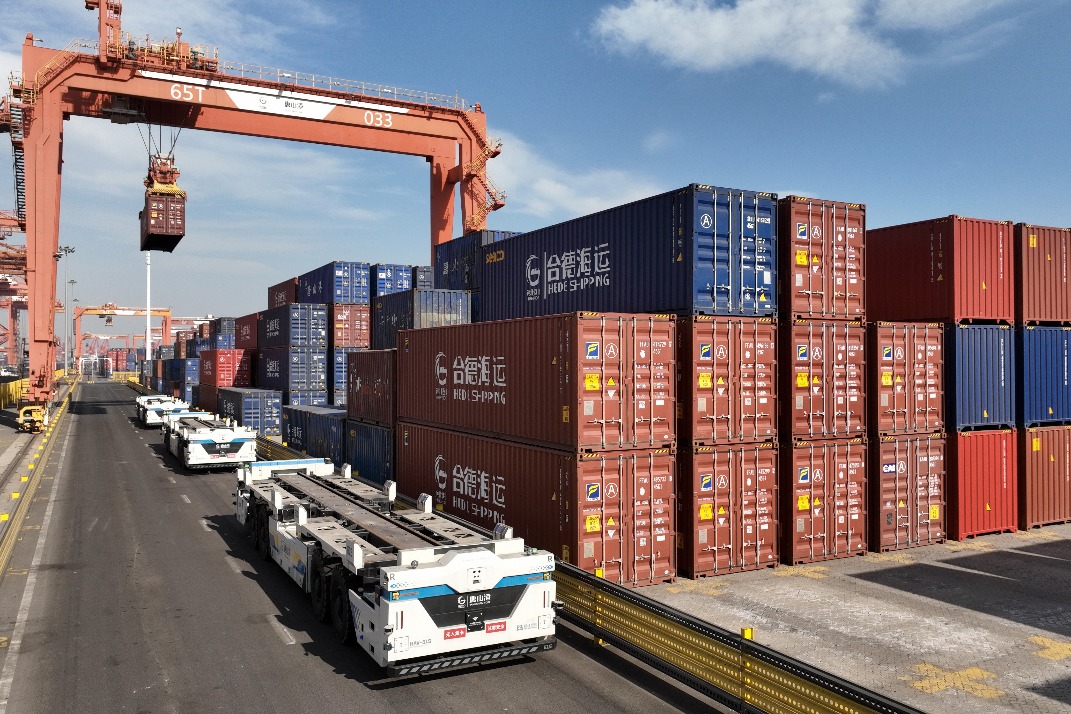Additional levies attract policy gaze
Free-trade setback forcing Chinese firms to get more creative, innovate

China's top economic regulator has pledged efforts to tackle issues faced by enterprises and support the development of the private sector, as it seeks to buffer the impact of the latest round of sweeping new tariffs from the United States.
Zheng Shanjie, head of the National Development and Reform Commission, hosted a meeting on Tuesday morning with a group of private businesspeople from Trina Solar, China-Base Ningbo Group Co Ltd, Guangdong Lingyi iTECH Manufacturing Co Ltd, Didi Chuxing and Goertek Inc. It listened to feedback on the implementation of macroeconomic policies at the micro level, discussed companies' responses to newly imposed US tariffs, and gathered opinions on strengthening foreign trade and employment.
The meeting comes as Beijing grapples with renewed trade headwinds, including Washington's latest round of tariff hikes on Chinese goods, while also seeking to stabilize the overall economy amid a sluggish global recovery and mounting uncertainties.
Looking ahead, the next step will be accelerating the implementation of already-announced supportive measures, strengthening research on policy reserves, and launching them in a timely and effective manner, the National Development and Reform Commission said in a statement posted on its official website on Tuesday.
During the meeting, business leaders said they are well prepared for the new US tariffs and are actively adopting countermeasures. At the same time, they acknowledged the stable domestic development environment and vast market potential, stating their confidence in overcoming difficulties and achieving breakthroughs.
On Tuesday, Trina Solar said in a reply to an investor request that, as of now, the company has sufficient inventory of solar modules stored in the US, and the cost of these modules is not expected to be impacted by the tariff hikes.
Meanwhile, as some products are currently in transit and about to clear Customs, the company is confident it can meet customer demand in the US market for the remainder of the year, according to market information provider Wind Info.
In the face of external uncertainties, Zheng said China should focus on doing its own work well.
He reiterated China's unwavering commitment to reform and opening-up, the importance of firing up dual circulation — in which domestic and international circulation coexist, with domestic circulation playing the primary role — and the need to respond to external uncertainties with domestic certainty.
The NDRC also pledged to improve regular communication mechanisms between the government and private enterprises, actively address real difficulties faced by companies, and promote the healthy, high-quality development of the private sector.
"China's efforts to boost domestic demand can offset the impact of the US tariff hikes," said Sun Xuegong, director-general of the department of policy study and consultation at the Chinese Academy of Macroeconomic Research, a think tank under the NDRC.
"I think Chinese enterprises are also prepared for that. They can expand the market outside the US and they can also make their products more competitive. I don't think the US tariff hikes can destroy Chinese exports. There's some impact, but Chinese exports also have strong resilience," Sun said.
Citing the rise of leading Chinese firms such as DeepSeek, he added, "China can find its way and move forward," adding that private firms play a key role in supporting the country's economic development.
It is widely acknowledged that the private sector boosted China's high growth in recent decades. Private firms in China contribute more than 60 percent of GDP, 70 percent of technological innovation and 80 percent of urban employment, official data showed.
"In China's transition to the innovation-driven economy, the private sector could play a crucial role," Sun added. "I expect more favorable policy to support the private economy to develop in China."
While China still faces near-term economic headwinds, Ben Simpfendorfer, a partner at consultancy Oliver Wyman, said he believes China's long-term prospects remain strong.
"China needs to double down on its pursuit of innovation — less focused on the potential short-term impact of US tariff hikes, and more focused on what the long-term benefits are of continuing to invest in more advanced sectors," Simpfendorfer said.




































